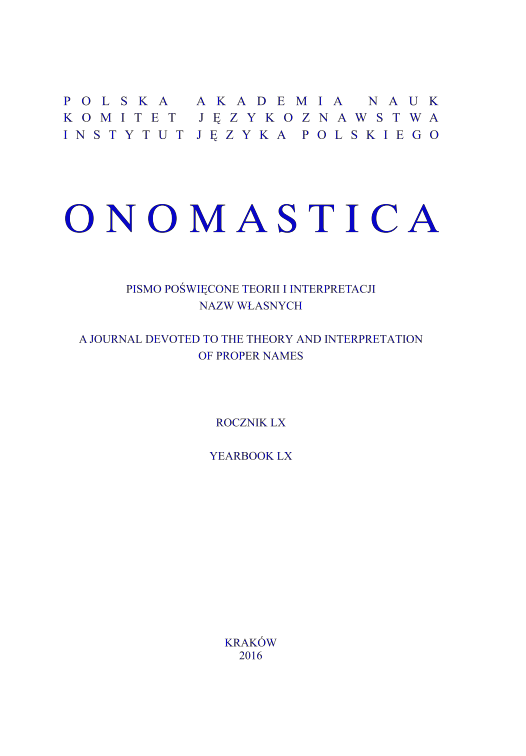Abstract
Geographical names are extremely helpful in giving evidence of early settlements and their inhabitants due to their solid anchorage in the landscape, even in the case of population changes. Through the investigation of these place names, information can be gathered not only on the name giver, but also on the settlers who took on the names later on. Therefore, it is considered that any linguistic investigation has to start from the river and place names of a region. The utilization of geographical names yields the following findings: — The centre of Old Slavic names is situated on the northern slope of the Carpathian Mountains, approximately between Bukovina and Krakow; it is based on a substrate of older, Indo-European hydronyms. — The expansion of the East Slavic tribes bypasses the Pripyat Marshes and extends further through Central Russia and especially to the North and the East. — West Slavic settlers reach their new settlement areas through migration from Bohemia and further on to Saxonia and Thuringia, and also through Western Poland to Brandenburg and Mecklenburg-Western Pomerania. — The migration of the South Slavs takes place in two big, yet separate flows, on the one hand through the Moravian Gate to Slovenia, Hungary and Croatia, and on the other hand on the Eastern edge of the Carpathian Mountains to Serbia and Bulgaria.References
Babik, Z. (2001). Najstarsza warstwa nazewnicza na ziemiach polskich. Kraków: TAiWPN Universitas.
Bijak, U. (2013). Nazwy wodne dorzecza Wisły. Potamonimy odapelatywne. Kraków: IJP PAN.
Brather, S. (2004). Ethnische Interpretationen in der frühgeschichtlichen Archäologie. Berlin: De Gruyter.
Casemir, K. (2003). Die Ortsnamen des Landkreises Wolfenbüttel und der Stadt Salzgitter. Bielefeld: Verlag für Regionalgeschichte.
Dini, P. U., Udolph, J. (2005). Slavisch-baltisch-germanische Sprachbeziehungen. In: Reallexikon der Germanischen Altertumskunde, Bd. 29. Berlin–New York: De Gruyter, S. 59–78.
Haase, D. et al. (2007). Loess in Europe — its spatial distribution based on a European Loess Map, scale 1 : 2,500,000. Quaternary Scienc Reviews 26 (9–10): 1301–1312, www.ufz.de/export/data/1/28154_European_Loess_Map_hires.jpg.
Hydronymia Europaea. Hrsg. von W. P. Schmid. Bd. 1–18 und Supplementbände. Wiesbaden–Stuttgart: Franz Steiner Verlag, 1985–2006.
Jurkowski, M. (1971). Ukraińska terminologia hydrograficzna. Wrocław: Zakład Narodowy im. Ossolińskich.
Krahe, H. (1964). Unsere ältesten Flußnamen. Wiesbaden: O. Harrassowitz.
Rozwadowski, J. (1948). Studia nad nazwami wód słowiańskich. Kraków: PAU.
Rymut, K., Majtán, M. (1998). Gewässernamen im Flußgebiet des Dunajec (= Hydronymia Europaea, Lfg. 13). Stuttgart: Franz Steiner Verlag.
Schmid, W. P. (1994). Linguisticae Scientiae Collectanea. Ausgewählte Schriften. Berlin–New York: De Gruyter.
Schuster-Šewc, H. (2000). Das Sorbische im slawischen Kontext. Ausgewählte Studien. Bautzen: Domowina.
Sławski, F. (red.) (1974). Słownik prasłowiański. T. 1. Wrocław: Zakład Narodowy im. Ossolińskich.
Udolph, J. (1979). Studien zu slavischen Gewässernamen und Gewässerbezeichungen. Ein Beitrag zur Fragen nach der Urheimat der Slaven. Heidelberg: Winter.
Udolph, J. (1981). Die Landnahme der Ostslaven im Lichte der Namenforschung. Jahrbücher für Geschichte Osteuropas, 29, S. 321–336.
Udolph, J. (1990). Die Stellung der Gewässernamen Polens innerhalb der alteuropäischen Hydronymie. Heidelberg: C. Winter.
Udolph, J. (1997). Alteuropäische Hydronymie und urslavische Gewässernamen. Onomastica, 42, S. 21–70.
Udolph, J. (2014). Ethnogenese und Urheimat der Slaven. In: Die Slavischen Sprachen, Bd. 1. Berlin [u. a.]: De Gruyter, S. 1131–1144.
Udolph, J. (im Druck). Baltisch, Slavisch, Germanisch — Kontakte und Beziehungen aus der Sicht der Onomastik.
Vasmer, M. (1971). Schriften zur slavischen Altertumskunde und Namenkunde. Hrsg. v. H. Bräuer. Bd. 1–2. Berlin: [Osteuropa-Institut]–Wiesbaden: Kommission bei O. Harrassowitz.
Wenzel, W. (2014). Namen und Geschichte. Orts- und Personennamen im deutsch-slawischen Sprachkontaktraum als historische Zeugnisse. Hrsg. v. A. u. S. Brendler. Hamburg: baar.

